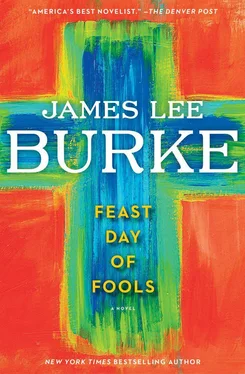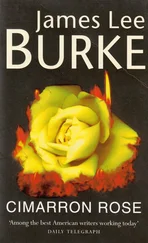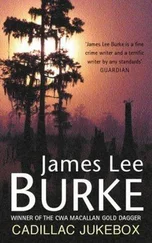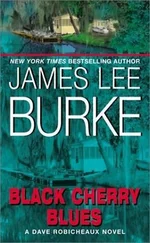James Burke - Feast Day of Fools
Здесь есть возможность читать онлайн «James Burke - Feast Day of Fools» весь текст электронной книги совершенно бесплатно (целиком полную версию без сокращений). В некоторых случаях можно слушать аудио, скачать через торрент в формате fb2 и присутствует краткое содержание. Жанр: Полицейский детектив, на английском языке. Описание произведения, (предисловие) а так же отзывы посетителей доступны на портале библиотеки ЛибКат.
- Название:Feast Day of Fools
- Автор:
- Жанр:
- Год:неизвестен
- ISBN:нет данных
- Рейтинг книги:4 / 5. Голосов: 1
-
Избранное:Добавить в избранное
- Отзывы:
-
Ваша оценка:
- 80
- 1
- 2
- 3
- 4
- 5
Feast Day of Fools: краткое содержание, описание и аннотация
Предлагаем к чтению аннотацию, описание, краткое содержание или предисловие (зависит от того, что написал сам автор книги «Feast Day of Fools»). Если вы не нашли необходимую информацию о книге — напишите в комментариях, мы постараемся отыскать её.
Feast Day of Fools — читать онлайн бесплатно полную книгу (весь текст) целиком
Ниже представлен текст книги, разбитый по страницам. Система сохранения места последней прочитанной страницы, позволяет с удобством читать онлайн бесплатно книгу «Feast Day of Fools», без необходимости каждый раз заново искать на чём Вы остановились. Поставьте закладку, и сможете в любой момент перейти на страницу, на которой закончили чтение.
Интервал:
Закладка:
“What we gonna do now, jefe?” Negrito said, squatting down next to him. He wore a greasy leather flop hat pushed back on his head, his hair curling like flames from under it.
Because Negrito was of mixed blood and his first language was bastardized English, he believed he and Krill were brothers in arms. But Krill neither liked nor trusted Negrito, whose facial features resembled those of an orange baboon that had fallen into a tub of bleach.
Krill continued to gaze at the desert and the way the light pooled in the clouds even though the sun had already set.
“Don’t believe that stuff about La Magdalena. She ain’t got no power, man,” Negrito said. “You know what they say about puta from over there. It’s sideways. That’s the only difference.”
Krill’s expression never changed, as though Negrito’s words were confetti falling on a flat stone. Out of the corner of his eye, he could see Negrito leaning forward, dangerously close to the edge of the bluff, trying to earn his attention.
“Why’s this guy so important?” Negrito asked. “He got a lot of dope hid someplace?”
“See down there below?” Krill said. “That’s a coyote den. See in that creek bed? Those are cougar tracks. The cougar has to kill fifty fawns to feed just one kitten. Except there aren’t fifty fawns around here. That means the coyote’s pups have to die instead.”
Negrito’s eyes went back and forth as he tried to puzzle through Krill’s statement. In the fading spark of sun on the horizon, his face was as rosy as a drunkard’s, his jutting forehead knurled, his mouth ringed with whiskers. “I’ll get it out of her. You say the word, jefe . She’ll be asking for knee pads,” he said.
Krill stared into Negrito’s face. “I’m not your chief. I’m nobody’s chief. You follow me or you don’t follow me.”
Negrito brushed one hand on top of the other, the horned edges of his palms rasping like sandpaper, his gaze avoiding Krill’s. He rocked on his heels, the points of his cowboy boots inches from the edge of the bluff. “You need a woman. It ain’t natural to be out here long without a woman. We all need a woman. Maybe we ought to go back to Durango for a while.”
Krill stood up and looked at the other men, all of whom were cooking pieces of jackrabbits they had killed and dressed and speared on sticks above a fire they had built inside a circle of stones. He picked up his rifle and put it across his shoulders and draped his arms over either end of it, creating a silhouette like that of a crucified man. “In the morning,” he said.
“We get out of here in the morning?” Negrito said. “Maybe to Durango?”
“You heard me, hombre.”
“Where you going now?”
“You’ll hear one shot. It’ll be for the cougar. You hear more than one shot, that means I found some real pissed-off gringos out there.”
“Because of what we done to that cop?”
“He worked for the DEA.”
“Man, you didn’t tell us that.”
“You still want to go after La Magdalena?”
Negrito’s eyes contained no emotion, as though they were prosthetic and had been inserted into his face by an indifferent thumb. He stared emptily at the desert, his eyelids fluttering when a cloud of bats lifted from a cave opening down below. Then he looked into the darkness, perhaps considering options, entertaining thoughts he hid by rubbing his forehead, shielding his eyes.
“You think too much, Negrito,” Krill said. “When a man thinks too much, he’s tempted to go beyond his limitations.”
Negrito stood up and took off his hat. “Watch this,” he said. He flipped his hat in the air, then scooted under it, catching it squarely on his head, his face splitting into an ape’s grin. He wobbled slightly, his arms straight out for balance, rocks spilling from under his boots over the edge of the bluff. “ Chingado, that scared me. Don’t worry, jefe. I’ll always back you up. I don’t care about no pissed-off gringos or Chinese puta that thinks her shit don’t stink, either. You’re my jefe whether you like it or not. I love you, hermano.”
Hackberry Holland had come to believe that age was a separate country you did not try to explain to younger people, primarily because they had already made up their minds about it and any lessons you had learned from your life were not the kind many people were interested in hearing about. If age brought gifts, he didn’t know what they were. It had brought him neither wisdom nor peace of mind. His level of desire was the same, the lust of his youth glowing hot among the ashes each morning he woke. He could say with a degree of satisfaction that he didn’t suffer fools and drove from his company anyone who tried to waste his time, but otherwise his dreams and his waking day were defined by the same values and frame of reference that came with his birthright. If age had marked a change in him, it lay in his acceptance that loneliness and an abiding sense of loss were the only companions some people would ever have.
The most influential event in Hackberry’s life had been his marriage to Rie Velasquez, a labor organizer for the United Farm Workers of America. When she died of uterine cancer, Hackberry had sold his ranch on the Guadalupe River and moved down to the border, leaving behind all memory of the idyllic life they’d shared, ridding himself of the things she had touched that made him so lonely he wanted to drink again, embracing the aridity of a parched land and its prehistoric ambience and its violent sunsets, the way a Bedouin enters the emptiness of the desert and is subsumed and made insignificant by it. Then bit by bit the horse farm he bought became a hologram, a place that fused past and present and re-created his childhood and adolescence and his life with Rie and their twin sons in one shimmering, timeless vision. It was a place where a man could see his beginning and his end, an island that was governed by reason and stewardship and the natural ebb and flow of the seasons, a place where a man no longer had to fear death.
He had two good wells on his land, and a four-stall barn and two railed pastures where he grazed his quarter horses and registered Missouri foxtrotters. He was also the unofficial owner of three dogs, a one-eyed cat, and two raccoons, none of whom had names but whom he fed outside the barn every morning and night.
His house was painted battleship gray and had a wide gallery and a breezy screened porch in back and a rock garden and a deep-green lawn he watered with soak hoses and flower beds planted with roses he entered each summer in the competition at the county fair. A china-berry tree grew in his backyard, and a slender palm tree grew at the base of the hill behind the house. He built a brooder house on the side of the barn, and his chickens laid eggs all over the property, under his tractor and in his tack room. On each of his horse tanks he had constructed small ladders out of chicken wire that he wrapped over the lip of the tank, so small creatures that fell into the water could find their way out again. In one way or another, every day that he spent on his ranch became part of an ongoing benediction.
The two gun cases in his office held a Henry repeater, an 1873 Winchester, a. 45-70 trapdoor of the kind the Seventh Cavalry carried into the Little Big Horn, an ’03 Springfield, a German Luger, a nine-millimeter Beretta, a Ruger Buntline. 22 Magnum, and the converted. 44 Navy Colt his grandfather, Old Hack, had carried the morning he knocked John Wesley Hardin from his saddle and kicked him cross-eyed and nailed him down with chains in a wagon bed before transporting him to the Cuero jail.
Hackberry loved the place he lived, and he loved waking inside its soft radiance in the morning, and he loved following his grandfather’s admonition to feed his animals before he fed himself. He loved the smell of his roses inside the coolness of the dawn and the smell of well water bursting into the horse tank when he released the chain on the windmill. He loved the warm odor of grass on the breath of his horses and the vinegary smell of their coats, and the powdery green cloud of hay particles that rose around him when he pulled a bale apart and scattered it on the concrete pad in the barn.
Читать дальшеИнтервал:
Закладка:
Похожие книги на «Feast Day of Fools»
Представляем Вашему вниманию похожие книги на «Feast Day of Fools» списком для выбора. Мы отобрали схожую по названию и смыслу литературу в надежде предоставить читателям больше вариантов отыскать новые, интересные, ещё непрочитанные произведения.
Обсуждение, отзывы о книге «Feast Day of Fools» и просто собственные мнения читателей. Оставьте ваши комментарии, напишите, что Вы думаете о произведении, его смысле или главных героях. Укажите что конкретно понравилось, а что нет, и почему Вы так считаете.












